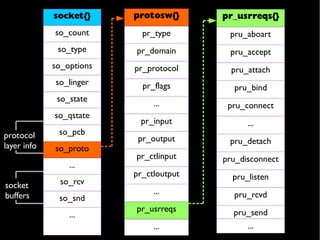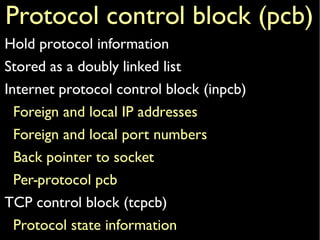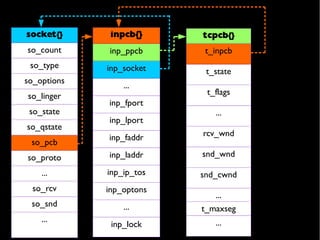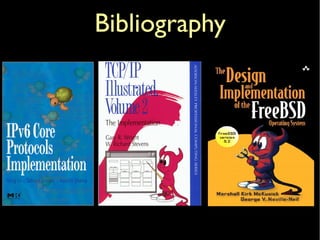The document provides an overview of the TCP/IP network stack implementation in the FreeBSD kernel. It describes the key data structures used, including mbufs for packet handling, domains and protosw structures for protocol handling, and protocol control blocks (PCBs) that contain per-connection state. Examples are given of different mbuf types like simple, packet header, and external cluster mbufs.
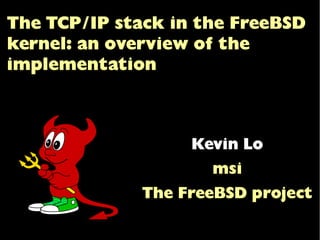
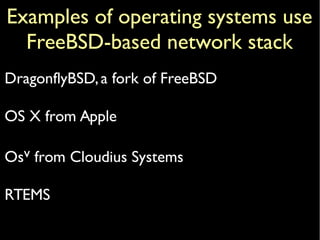

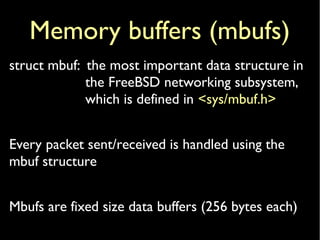
![mbuf structure
struct mbuf {
struct m_hdr m_hdr;
union {
struct {
struct pkthdr MH_pkthdr; /* M_PKTHDR set */
union {
struct m_ext MH_ext; /* M_EXT set */
char MH_databuf[MHLEN];
} MH_dat;
} MH;
char M_databuf[MLEN]; /* !M_PKTHDR, !M_EXT */
} M_dat;
};](https://image.slidesharecdn.com/coscup14-freebsdtcpip-slides-140721040309-phpapp01/85/The-TCP-IP-stack-in-the-FreeBSD-kernel-COSCUP-2014-5-320.jpg)

![struct mbuf {
struct m_hdr m_hdr;
union {
struct {
struct pkthdr MH_pkthdr; /* M_PKTHDR set */
union {
struct m_ext MH_ext; /* M_EXT set */
char MH_databuf[MHLEN];
} MH_dat;
} MH;
char M_databuf[MLEN]; /* !M_PKTHDR, !M_EXT */
} M_dat;
};
Simple mbuf](https://image.slidesharecdn.com/coscup14-freebsdtcpip-slides-140721040309-phpapp01/85/The-TCP-IP-stack-in-the-FreeBSD-kernel-COSCUP-2014-7-320.jpg)
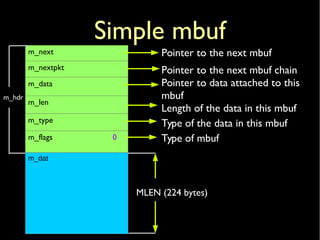
![struct mbuf {
struct m_hdr m_hdr;
union {
struct {
struct pkthdr MH_pkthdr; /* M_PKTHDR set */
union {
struct m_ext MH_ext; /* M_EXT set */
char MH_databuf[MHLEN];
} MH_dat;
} MH;
char M_databuf[MLEN]; /* !M_PKTHDR, !M_EXT */
} M_dat;
};
Packet header mbuf](https://image.slidesharecdn.com/coscup14-freebsdtcpip-slides-140721040309-phpapp01/85/The-TCP-IP-stack-in-the-FreeBSD-kernel-COSCUP-2014-9-320.jpg)
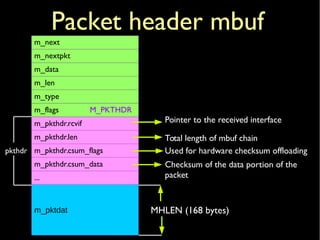
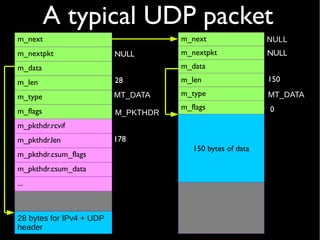
![struct mbuf {
struct m_hdr m_hdr;
union {
struct {
struct pkthdr MH_pkthdr; /* M_PKTHDR set */
union {
struct m_ext MH_ext; /* M_EXT set */
char MH_databuf[MHLEN];
} MH_dat;
} MH;
char M_databuf[MLEN]; /* !M_PKTHDR, !M_EXT */
} M_dat;
};
Mbuf page cluster](https://image.slidesharecdn.com/coscup14-freebsdtcpip-slides-140721040309-phpapp01/85/The-TCP-IP-stack-in-the-FreeBSD-kernel-COSCUP-2014-12-320.jpg)
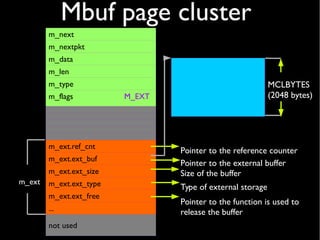
![struct mbuf {
struct m_hdr m_hdr;
union {
struct {
struct pkthdr MH_pkthdr; /* M_PKTHDR set */
union {
struct m_ext MH_ext; /* M_EXT set */
char MH_databuf[MHLEN];
} MH_dat;
} MH;
char M_databuf[MLEN]; /* !M_PKTHDR, !M_EXT */
} M_dat;
};
Package header + page cluster](https://image.slidesharecdn.com/coscup14-freebsdtcpip-slides-140721040309-phpapp01/85/The-TCP-IP-stack-in-the-FreeBSD-kernel-COSCUP-2014-14-320.jpg)
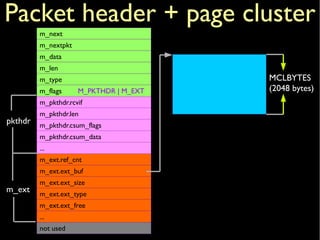
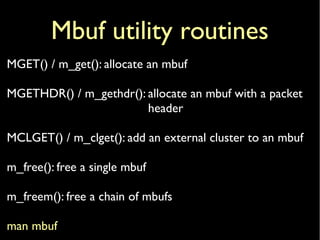
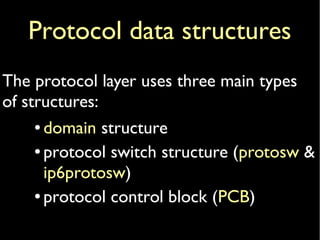
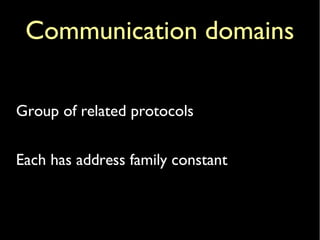
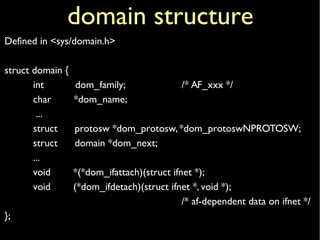
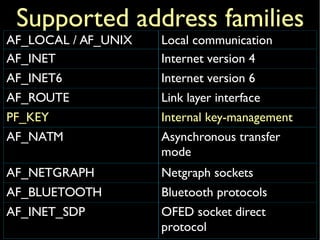
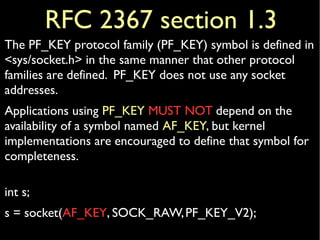
![inetdomainstruct domain inetdomain = {
.dom_family = AF_INET,
.dom_name = "internet",
.dom_protosw = inetsw,
.dom_protoswNPROTOSW = &inetsw[sizeof(inetsw)/sizeof(inetsw[0])],
#ifdef RADIX_MPATH
.dom_rtattach = rn4_mpath_inithead,
#else
.dom_rtattach = in_inithead,
#endif
#ifdef VIMAGE
.dom_rtdetach = in_detachhead,
#endif
.dom_rtoffset = 32,
.dom_maxrtkey = sizeof(struct sockaddr_in),
.dom_ifattach = in_domifattach,
.dom_ifdetach = in_domifdetach
};
VNET_DOMAIN_SET(inet);](https://image.slidesharecdn.com/coscup14-freebsdtcpip-slides-140721040309-phpapp01/85/The-TCP-IP-stack-in-the-FreeBSD-kernel-COSCUP-2014-22-320.jpg)
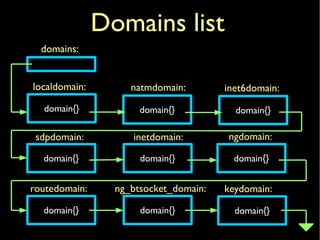
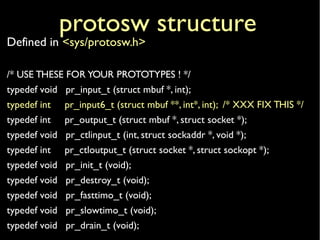
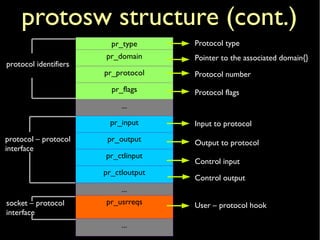
![inetsw[] switch table
struct protosw inetsw[] = {
{
.pr_type = SOCK_DGRAM,
.pr_domain = &inetdomain,
.pr_protocol = IPPROTO_UDP,
.pr_flags = PR_ATOMIC|PR_ADDR,
.pr_input = udp_input,
.pr_ctlinput = udp_ctlinput,
.pr_ctloutput = udp_ctloutput,
.pr_init = udp_init,
#ifdef VIMAGE
.pr_destroy = udp_destroy,
#endif
.pr_usrreqs = &udp_usrreqs
},](https://image.slidesharecdn.com/coscup14-freebsdtcpip-slides-140721040309-phpapp01/85/The-TCP-IP-stack-in-the-FreeBSD-kernel-COSCUP-2014-26-320.jpg)
